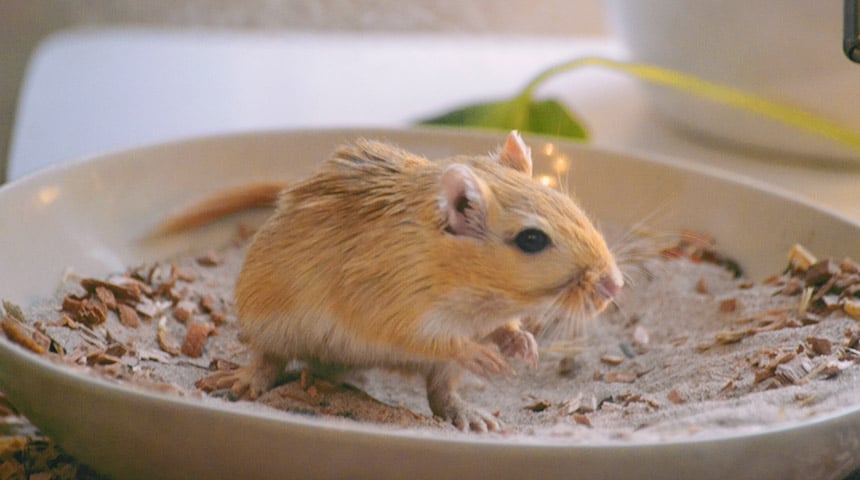
Gerbils are rodents closely related to rats and mice, native to semi-desert and desert regions of Asia, Africa and the Middle East, with a life expectancy of 3 to 4 years. They are very lively and active animals, not recommended for young children. They are social animals, living in family groups. They are, however, territorial and can be aggressive when a new individual is introduced to a group, or when an animal is reintroduced to its group following a long absence (e.g., hospitalization).
Only gerbils' incisors grow continuously. Similar to rats, it's normal for gerbils' incisor enamel to be orange in colour.
Both male and female gerbils have a marking gland in the form of an oval, orange-coloured alopecia (hairless) area on the belly.
As a desert species, gerbils consume little water and urinate sparingly. However, they still need access to clean, fresh water at all times. They also like to bathe in sand baths, which should be made available to them on a regular basis (30 minutes every day).
Frequent Illnesses
Facial Eczema
Gerbils can develop skin lesions on the face. The cause of this condition is uncertain, but it seems to be associated with increased porphyrin production by Harderian glands, which causes skin irritation. Superinfection by skin bacteria will then aggravate the condition. This condition is often found in gerbils living in poorly ventilated environments, with bedding that's excessively dusty, damp or not changed frequently enough, or living in overcrowded conditions.
Digestive Illnesses
Several conditions can cause diarrhea in gerbils. Any change in the consistency and appearance of their stools should prompt veterinary consultation quickly.
Tail Scalp
Several species of rodents, including the gerbil, have the ability to escape if grabbed by the tail. This means that if you grab a gerbil by the tail, its skin will remain in your hands, allowing it to escape.
In such cases, the only possible solution is to amputate the tail.
Degenerative Diseases and Neoplasia
Gerbils are animals that rarely become ill. As they age, however, they can develop various types of cancer or degenerative diseases.
If your gerbil requires care that cannot be provided at your regular clinic, we will transfer its file to our specialty team working at the Centre Vétérinaire Laval.

